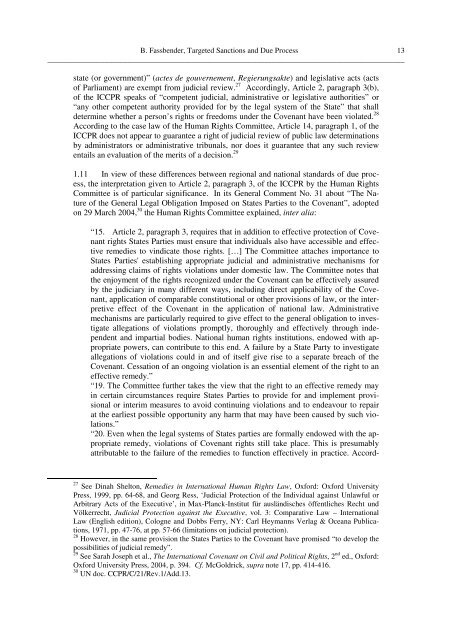Targeted Sanctions and Due Process - United Nations Treaty ...
Targeted Sanctions and Due Process - United Nations Treaty ...
Targeted Sanctions and Due Process - United Nations Treaty ...
You also want an ePaper? Increase the reach of your titles
YUMPU automatically turns print PDFs into web optimized ePapers that Google loves.
B. Fassbender, <strong>Targeted</strong> <strong>Sanctions</strong> <strong>and</strong> <strong>Due</strong> <strong>Process</strong><br />
13<br />
______________________________________________________________________________________________<br />
state (or government)” (actes de gouvernement, Regierungsakte) <strong>and</strong> legislative acts (acts<br />
of Parliament) are exempt from judicial review. 27 Accordingly, Article 2, paragraph 3(b),<br />
of the ICCPR speaks of “competent judicial, administrative or legislative authorities” or<br />
“any other competent authority provided for by the legal system of the State” that shall<br />
determine whether a person’s rights or freedoms under the Covenant have been violated. 28<br />
According to the case law of the Human Rights Committee, Article 14, paragraph 1, of the<br />
ICCPR does not appear to guarantee a right of judicial review of public law determinations<br />
by administrators or administrative tribunals, nor does it guarantee that any such review<br />
entails an evaluation of the merits of a decision. 29<br />
1.11 In view of these differences between regional <strong>and</strong> national st<strong>and</strong>ards of due process,<br />
the interpretation given to Article 2, paragraph 3, of the ICCPR by the Human Rights<br />
Committee is of particular significance. In its General Comment No. 31 about “The Nature<br />
of the General Legal Obligation Imposed on States Parties to the Covenant”, adopted<br />
on 29 March 2004, 30 the Human Rights Committee explained, inter alia:<br />
“15. Article 2, paragraph 3, requires that in addition to effective protection of Covenant<br />
rights States Parties must ensure that individuals also have accessible <strong>and</strong> effective<br />
remedies to vindicate those rights. […] The Committee attaches importance to<br />
States Parties' establishing appropriate judicial <strong>and</strong> administrative mechanisms for<br />
addressing claims of rights violations under domestic law. The Committee notes that<br />
the enjoyment of the rights recognized under the Covenant can be effectively assured<br />
by the judiciary in many different ways, including direct applicability of the Covenant,<br />
application of comparable constitutional or other provisions of law, or the interpretive<br />
effect of the Covenant in the application of national law. Administrative<br />
mechanisms are particularly required to give effect to the general obligation to investigate<br />
allegations of violations promptly, thoroughly <strong>and</strong> effectively through independent<br />
<strong>and</strong> impartial bodies. National human rights institutions, endowed with appropriate<br />
powers, can contribute to this end. A failure by a State Party to investigate<br />
allegations of violations could in <strong>and</strong> of itself give rise to a separate breach of the<br />
Covenant. Cessation of an ongoing violation is an essential element of the right to an<br />
effective remedy.”<br />
“19. The Committee further takes the view that the right to an effective remedy may<br />
in certain circumstances require States Parties to provide for <strong>and</strong> implement provisional<br />
or interim measures to avoid continuing violations <strong>and</strong> to endeavour to repair<br />
at the earliest possible opportunity any harm that may have been caused by such violations.”<br />
“20. Even when the legal systems of States parties are formally endowed with the appropriate<br />
remedy, violations of Covenant rights still take place. This is presumably<br />
attributable to the failure of the remedies to function effectively in practice. Accord-<br />
27 See Dinah Shelton, Remedies in International Human Rights Law, Oxford: Oxford University<br />
Press, 1999, pp. 64-68, <strong>and</strong> Georg Ress, ‘Judicial Protection of the Individual against Unlawful or<br />
Arbitrary Acts of the Executive’, in Max-Planck-Institut für ausländisches öffentliches Recht und<br />
Völkerrecht, Judicial Protection against the Executive, vol. 3: Comparative Law – International<br />
Law (English edition), Cologne <strong>and</strong> Dobbs Ferry, NY: Carl Heymanns Verlag & Oceana Publications,<br />
1971, pp. 47-76, at pp. 57-66 (limitations on judicial protection).<br />
28 However, in the same provision the States Parties to the Covenant have promised “to develop the<br />
possibilities of judicial remedy”.<br />
29 See Sarah Joseph et al., The International Covenant on Civil <strong>and</strong> Political Rights, 2 nd ed., Oxford:<br />
Oxford University Press, 2004, p. 394. Cf. McGoldrick, supra note 17, pp. 414-416.<br />
30 UN doc. CCPR/C/21/Rev.1/Add.13.
















